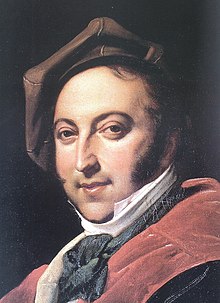Gioachino Rossini
Italian opera composer (1792–1868)
(Redirected from Rossini)
Gioachino Antonio Rossini (February 29 1792 – November 13 1868) was an Italian composer who lived for much of his adult life in France. He is best remembered for the approximately 40 operas he wrote in his youth, though his chamber music and sacred works are also highly regarded by many.

Quotes
edit- Datemi il conto della lavandaia e vi metterò in musica anche quello.
- Give me the laundress' bill and I will set to music even that.
- Indro Montanelli L'Italia giacobina e carbonara, Rizzoli, Milano 1972, p. 612.
- Je le prends deux fois par semaine, Haydn quatre fois et Mozart tous les jours. Vous me direz, Beethoven est un colosse, qui vous donne souvent des coups de poing dans les côtes, tandisque Mozart est toujours adorable. C'est que lui a eu la chance d'aller très jeune en Italie à un époque, où l'on chantait encore bien.
- I take him [Beethoven] twice a week, Haydn four times, and Mozart every day. You will tell me that Beethoven is a Colossus who often gives you a dig in the ribs, whilst Mozart is always adorable; it is that the latter had the chance of going very young to Italy, at a time when they still sang well.
- Alfred Christlieb Kalischer Beethoven und seine Zeitgenossen (1908) p. 83. Translation from Charlotte Moscheles (trans. A. D. Coleridge) Life of Moscheles (1873) vol. 2, p. 275.
- Bon Dieu; la voilà terminée, cette pauvre petite messe. Est-ce bien de la musique sacrée que je viens de faire, ou bien de la sacré musique ? J'étais né pour l'opera buffa, tu le sais bien! Peu de science, un peu de coeur, tout est là. Sois donc béni et accorde-moi le Paradis.
- Dear God, here it is finished, this poor little Mass. Is this sacred music which I have written or music of the devil? I was born for opera buffa, as you well know. A little science, a little heart, that's all. Be blessed, then, and admit me to Paradise.
- Epigraph to his Petite Messe Solennelle (1863). Translation from Emanuele Senici (ed.) The Cambridge Companion to Rossini (2004) p. 23.
- Cette petite composition qui est, hélas, le dernier péché mortel de ma vieillesse.
- This little composition, which is, alas, the last mortal sin of my old age.
- Introductory note to the Petite Messe Solennelle. Translation from Justin Wintle (ed.) Makers of Nineteenth Century Culture (2002) vol. 2, p. 527.
- Monsieur Wagner a de beaux moments, mais de mauvais quart d'heures.
- Monsieur Wagner has good moments, but awful quarters of an hour!
- Letter to Emile Naumann, April 1867, quoted in E Naumann Italienische Tondichter (1883) vol. 4, p. 5. Translation from The Riverside Dictionary of Biography (2005) p. 689.
- Melodia semplice e varietà nel ritmo.
- Simple melody and variety in rhythm.
- His motto for Italian music, formulated in a letter to Filippo Filippi, August 26, 1868; Luca Somigli Legitimizing the Artist (2003) p. 103.
- Often misquoted as "Simple melody – clear rhythm!"
- Aspettate fino alla sera prima del giorno fissato per la rappresentazione. Nessuna cosa eccita più l'estro come la necessità, la presenza d'un copista, che aspetta il vostro lavoro e la ressa d'un impresario in angustie, che si strappa a ciocche i capelli. A tempo mio in Italia tutti gli impresari erano calvi a trent'anni.
- Wait until the evening before opening night. Nothing primes inspiration more than necessity, whether it be the presence of a copyist waiting for your work or the prodding of an impresario tearing his hair. In my time, all the impresarios in Italy were bald at thirty.
- From an undated letter, published in Luigi Rognoni Gioacchino Rossini (1968) p. 337. Translation from Josiah Fisk and Jeff Nichols (eds.) Composers on Music (1997) p. 67.
- On the right time to write an overture.
- Music is a kind of harmonious language.
- Zanolini, Biografia di Gioachino Rossini (1875)
Quotes about Rossini
edit- Rossini, in music, is the genius of sheer animal spirits. It is a species as inferior to that of Mozart, as the cleverness of a smart boy is to that of a man of sentiment; but it is genius nevertheless.
- Leigh Hunt, "Going to the Play Again", The Companion (1828) p. 14.
- Rossini, divino Maestro, Helios von Italien, der du deine klingenden Strahlen über die Welt verbreitest!
- Rossini, divino Maestro, Helios of Italy, spreading your rays over the world!
- Heinrich Heine Reisebilder, Part 3, chap. 19 [1]; translation from Laura Bandiera & Diego Saglia (eds.) British Romanticism and Italian Literature (2005) p. 157.
- His moral deficiencies as an artist were quite extraordinary. When he found the natural superiority of his genius in conflict with the ignorance and frivolity of the public – and the musical ignorance and frivolity of the Venetians and Neapolitans can hardly be overstated – he surrendered without a struggle. Although he was so able a man that it was easier and pleasanter to him to do his work intelligently than to conventionalize it and write down to the popular taste, he never persevered in any innovation that was not well received.
- George Bernard Shaw in The Illustrated London News, March 5, 1892.